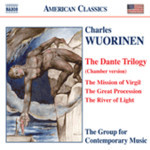
The Dante Trilogy
 $25.00
Out of Stock
$25.00
Out of Stock6+ weeks add to cart
CHARLES WUORINEN
The Dante Trilogy
The Group for Contemporary Music
[ Naxos American Classics / CD ]
Release Date: Thursday 1 January 2009
This item is currently out of stock. It may take 6 or more weeks to obtain from when you place your order as this is a specialist product.
"Charles Wuorinen's Dante Trilogy is a sequence of three ballets written in the 90s for Peter Martins and the New York City Ballet, inspired by the three books of the Divine Comedy." American Record Guide
"Charles Wuorinen's Dante Trilogy is a sequence of three ballets written in the 90s for Peter Martins and the New York City Ballet, inspired by the three books of the Divine Comedy. There is no explicit tone poetry on display here. Instead, Wuorinen, as might be expected, concentrates on purely formal elements of the poem to suggest musical directions: the number of syllables in a line, the number of stanzas, the number seven, and so forth. The intensive structural play beloved of serialists (symmetry, mirroring) is given the most emphasis, with all the dizzying fun set in Wuorinen's typical astringent atonal style.
These pieces are all recorded in their chamber versions. The Mission of Virgil (1993) takes us around the Inferno in a grand display for two pianos. Entertainingly episodic (this is ballet music, after all), some of the music is a delight, while the more diffuse incidental music-the stuff that gets edited out for ballet suites-is in need of the stage. Messrs Moredock and Grant, both pianists with the New York City Ballet, are spectacular.
The Great Procession (1995) through Purgatory is given here for six players (flute(s), clarinet(s), violin, cello, percussion and piano). Its various episodes are propelled along by an amusing 3D-second recurring bit of "traveling music". The sextet scoring is too thin to support the intensity of ideas. There is also some poor clarinet playing (especially in 'The Griffin'), unusual for this normally flawless ensemble.
Paradise is at least theoretically reached with The River of Light (1996), though the composer tells us the music is "in no sense narrative" or "referential". What it is is episodic to the point of incoherence, lacking in the humor and relative lightness of touch heard in the other two pieces in the set. Scored for an ensemble of 13 players, it does not offer a meaningful climax to the set, in spite of what seems to be intended as a glittering ending (it's just shrieky).
The Mission of Virgil was previously released on Koch. The other two pieces were recorded in concert at the Guggenheim in 1999."
--Review by Gimbel, American Record Guide